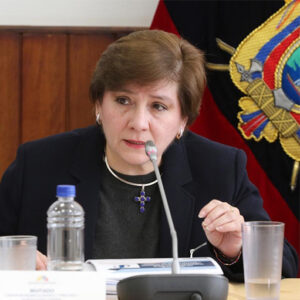Ecuador’s Superintendencia de Bancos (SB), which recently celebrated its 94th anniversary, is the new vice chair of AFI’s Financial Inclusion Initiative for Latin America and the Caribbean (FILAC), a regional initiative launched in 2016 as a driving force for advancing financial inclusion in Latin American and Caribbean countries. In part two of our interview with Ruth Arregui, the head of the superintendency, we focus on how COVID-19 has heightened awareness of the need to build a sustainable future and how she is building a pipeline of future women leaders.

AFI: How has COVID-19 and the climate emergency changed how we look at the sustainability of financial inclusion?
Arregui: The COVID-19 pandemic has highlighted the importance of a green recovery after the pandemic, with some referring to a “green light” guiding the path to economic recovery and shared prosperity.
Some useful policy lessons from the pandemic that we must consider include reducing climate-related risks and improving our resistance to epidemics. These lessons should help us design a recovery that mitigates, or at least does not aggravate, climate-related risks. As with climate change, the pandemic is a global risk that has shown the trade-offs between efficiency and resilience.
AFI: What can public and private sector stakeholders do to promote a green and sustainable recovery after the COVID-19 pandemic?
Arregui: Daily life is already changing. The consolidation of the home office is reducing both unnecessary travel times and carbon footprints while new technological innovations are working to reduce planet-warming emissions.
Private companies and governments can invest in and promote a global transition to less carbon-intensive energies and amplify research in the reduction and absorption of carbon. It is essential that investments take full advantage of sustainable changes in human habits and behaviors that are already taking place.
But as pandemics pose global risks, they also increase the costs associated with preventing new similar threats from emerging in the future. It is, therefore, important to consider managing risk prices by creating buffers, such as insurance, and by looking at providing other global public health-related goods and services, such as carbon sequestering.
AFI: How can financial institutions be encouraged to invest in green solutions?
Arregui: According to the Bank for International Settlements, by using regulatory arrangements, it is possible to create market incentives for companies and other financial entities that expand growth in the area of low-carbon emissions while contributing to better public health.
Socially responsible and sustainable financial institutions can promote investments that adhere to climate emergency criteria and establish green market standards by offering climate-friendly financial products and services. Also, they can direct their own investments and business relationships with organizations to promote a vision that encompasses a climate emergency approach.
Success, at this point, will depend on the deployment of multilateral cooperation in the management of climate change and pandemics, and the strengthening of capabilities that they can promote both in the public and private spheres.
AFI: AFI’s members in Latin America have an impressively high number of women leaders. As a leading woman in society, how do you see your role in supporting gender and women’s financial inclusion within your jurisdiction and across the region?
Arregui: Financial inclusion is essential for the autonomy of women in private and public life to guarantee that they can exercise their rights in the context of full equality. This concept is linked to both women’s economic autonomy, the ability of women to generate and control their economic resources, and their political autonomy, or the participation of women in making decisions that affect their lives and their community.
To promote the autonomy of women, it is important that the financial sector guarantees equitable access to a full range of financial services (e.g., savings, credit, insurance and payments) based on needs, and then accompanies these efforts with tailored financial education. The effects of financial inclusion are greater when historically excluded groups, such as women, are brought into the formal financial system.
AFI: How is SB applying the gender lens to its internal structures?
Arregui: Greater promotion of women’s participation and representation in leadership positions in organizations is important for achieving true gender parity. This is one of the reasons why, since the beginning of my term as superintendent, we increased the number of women in management positions to 48 percent in 2021 from 40 percent in 2019.
In cooperation with CAF, the development bank of Latin America, SB is also coordinating training sessions looking at the gender perspective of behavioral economics and financial inclusion. This will further strengthen the capacities of our technical staff to make effective, inclusive and comprehensive decisions with a gender lens.

 About
About
 Online
Online
 Data
Data



















